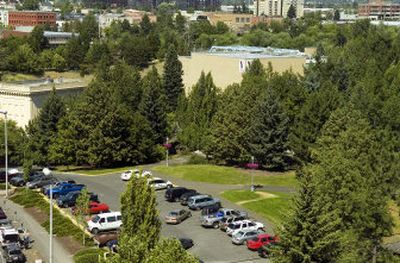YMCA sale in the balance

If the Spokane Park Board wants to prevent a 14-story condominium tower from being built on YMCA property at the edge of Riverfront Park, it must match a $5.3 million purchase offer by Friday.
The city board says it definitely plans to purchase the near-acre off Post Street overlooking the Spokane River. However, Park Board President Frank Knott said the board has not determined how it will raise the funds, which are due, incrementally, over the next couple of years. “We’re going to exercise our option. We have three or four plans we’re working on, but none of them is finalized,” Knott said, declining to elaborate. “We have the money available to us to make the down payment. We have the ability to borrow what we need for the rest of it.”
Driving the Park Board’s purchase is an agreement struck between the YMCA and developer Mark Pinch on June 29. The Park Board has a 30-day “right of first refusal” to match Pinch’s offer for the property.
The YMCA put its building up for sale last year, intending to use the money to move to a joint campus with the YWCA. The YWCA has sold its building overlooking the north bank of the Spokane River for $4 million and plans to move within the next two years to 3.5 acres at 930 N. Monroe. The YMCA would like to join the YWCA at that location. Both nonprofit organizations want to use the money from the sales to expand their buildings and broaden their services to the community.
For the Park Board to match the offer, it would need to put down an initial deposit of $150,000 upon execution of a sale agreement, followed by an additional deposit of $850,000 several months later. The balance of the $5.3 million would be required when the YMCA moves to its new home, estimated at the final quarter of 2008, said YMCA President Rig Riggins.
Both the YMCA and YWCA sought sale agreements that would permit them to remain in their current buildings until new structures are built to ensure no interruption of services.
The Park Board requested an extension of the 30-day window, which the YMCA denied, said Riggins. The city’s right to purchase the property comes from a clause within its longtime agreement to lease a parking lot to the YMCA. However, the time frame to respond to purchase offers was not defined so the two parties negotiated. The YMCA offered 15 days, and the city countered with 30, which the YMCA accepted, Riggins said.
“We agreed with their proposal,” he said. “We’ve been operating on this understanding it was a 30-day thing. We still expect they will honor it.”
The Park Board has mentioned several possibilities to pay for the land, including limited general obligation bonds or borrowing from other city departments. The board also has $800,000 in a reserve fund, according to Mike Stone, city parks director.
If the Park Board purchases the property, the YMCA must pay Pinch a penalty of $20,000 for time, effort and expenses, according to the purchase and sale agreement.
The YMCA contends the city must match all the pertinent conditions of Pinch’s offer. That includes a $90,000 donation to the YMCA’s fund-raising campaign. The YMCA and YWCA have said in the past that they will attempt to raise $25 million for their expanded joint campus and the YMCA’s planned north Spokane branch.
The YMCA can terminate the purchase and sale agreement by Nov. 1 with no penalties if it is unable to acquire property for its new building, negotiate an acceptable release of its property to serve as collateral for bond obligations, or meet its fund-raising goals, the agreement says.
In the case of a default, the YMCA keeps the deposit – either the $150,000 or $1 million total – and its property.
The YMCA acquired the land for its building in the mid-1950s through donations from Washington Water Power, now Avista Corp., and automobile dealer Ray Barton, news reports say.
For 30 years, the YMCA has leased city land just off Post Street as a parking lot. Attached to that land lease is a document titled: “The Basis for Cooperation between the city and the YMCA in Riverfront Park.” The document details the history of the city’s relations with the YMCA and how the parking lot lease came to be.
While planning its new building in the early 1960s, the YMCA needed to make sure it had adequate parking so it arranged to lease nearby property from the Great Northern Railroad. The railroad also offered the YMCA the first option to purchase the property. However, when Expo ‘74 came along, to help accommodate the World’s Fair, the YMCA did not publicly protest the closure of Howard Street nor did it pursue its option to purchase the nearby railroad property it had been leasing when that opportunity surfaced. The YMCA also moved out of its building so it could be used as Expo ‘74 headquarters. As a result, the city document says, the YMCA suffered reduced parking access, an awkward drop-off area and front entrance, diminished “walk-in” traffic, loss of street access, and loss of public exposure. The YMCA believes that business lost during Expo took years to replace.
To offset those consequences, the city agreed in 1976 to provide parking and drop-off areas in Riverfront Park with priority parking for YMCA members. The city also agreed to manage the parking area and give a portion of the parking revenue to the YMCA. That lease has been extended in five-year increments and is set to expire in December 2007.
Riggins and YMCA board members have said that the primary reason the YMCA wants to move is lack of sufficient parking. It began looking for a buyer for its downtown property last year, asking $5.75 million. The property’s 2007 assessment is $5.2 million, according to county property records.